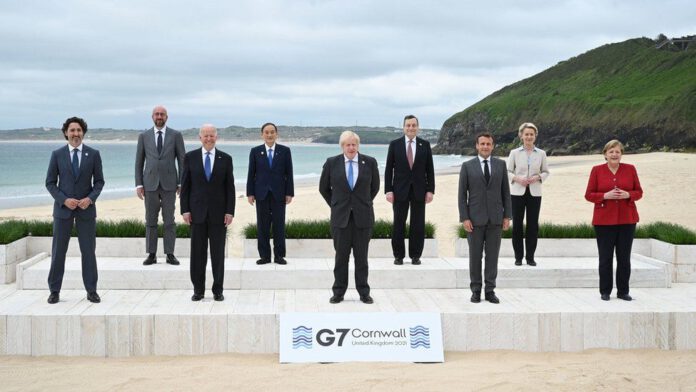The idea of forming the G7 after the global oil crisis in 1973 convinced the powerful leaders of the world’s major industrialized nations in 1975 that they needed closer and more coherent cooperation for the economic-security crisis caused by economic and oil shocks. But the failure of the Group of Seven in recent years, given the growth of tangible and intangible threats and the changing and fluid nature of threats, has led to the questioning of its existential philosophy.
In the current context, and given the out-of-control crises, especially transnational ones, and the conventional and unconventional internal and external challenges, what is most striking about the G7 is what the G7 can do. Let the current crisis situation take place in the world, in a situation where we are witnessing an increase in new crises and intensification of international tensions, and the Trumpists are closer to us than we think.
At the present, the Group of Seven is not essentially a democratic or even formal institution for resolving crises, but is now an organization made up of countries that seek a twisted version of global crises without the ability to resolve them, and that is it. Disability has complicated problems.
The Group of Seven may have accounted for about 50 percent of the global economy, but the problem is that it has less than 20 percent of the world’s population and cannot do it with 50 percent of the global economy for 80 percent of the world, at least democratically. What is more, in the current situation, the exclusion of the BRICS as emerging economies of Brazil, India, South Africa, Russia and China, along with other influential countries in the world and its undemocratic structure, is itself a kind of political apartheid that means imposing will from above by a minority. Less than 20% of the global population is over 80% of the majority.
The G7 is currently holding its 47th conference in London from June 11 to 13, with Britain’s withdrawal from the European Union, Germany’s insistence on rolling out Stream 2 and Biden’s heavy and unplanned borrowing, as well as deep divisions in Washington.
With Moscow and Beijing, which has gone beyond economic dimensions. The Covid-19 crisis, with its irreparable economic consequences, has cast a heavy shadow over the summit and overshadowed everything. It can be said that the G7 member states are experiencing more unstable and critical meetings than the previous ones, so in such a turbulent situation, the G7 is supposed to discuss how to manage the world to deal with global crises and challenges.
The G7 previously had a US-led core, like NATO, with a number of powerful actors aligned with the United States to maintain order, to work for global governance. Now when we talk about the Group of Seven, the first thing that comes to mind is what the seven member states of the Group are defending under the guise of world order; and how they are supposed to find ways to control their power and meet challenges and threats.
The first question is how this order, in the disorder it has created, is supposed to be the solution to crises and challenges; And how is it going to maintain international order under the umbrella of a superpower called the American Empire, whose power is declining and its people are fragmented, with organizational divisions and pessimism about the United States after the Trump incident? How is the G7 going to re-establish the lost international legal order for the world, along with the declining superpower, with the withdrawal and return of the United States to international treaties?
The main challenge facing the Group of Seven in particular is the conflict between the two camps of globalists and nationalists, in which China’s economic power also plays a role; And with the rise of the far right in Europe and Latin America, as well as the current of Trumpism in the United States, there is the possibility of the collapse of US-backed international organizations, groups, institutions and regimes at any moment.
In addition to the challenge of the rise of the far right and nationalist right in opposition to globalization, existing global crises are becoming increasingly complex. These include the possibility of Iran becoming a nuclear power, multiple security crises in the Middle East, how to deal with China, and the future of Israel’s presence in the region, and the G7 does not appear to be able to contain or deal with China and Russia.
Also, reach a consensus on a non-nuclear solution for Iran. Efforts to build a consensus against China to make blockade for Beijing economically and technologically, and to marginalize Moscow in the international system, even if the current G7 security agenda is on the agenda, are already clear. With the exception of Canada and perhaps the United Kingdom, other G7 nations, including Germany, France, Italy, and even Japan, will not support US security and economic policies against China and Russia.
The Group of 7 currently faces several challenges in maintaining the existing order and global division of labor based on its interests. One is the endogenous challenges of the existing order, and the other is the external challenges. The third category is the New World Order, which does not regard the Group of Seven as a representative of the world order in terms of its homogeneity and mere possession of about half of the world’s gross domestic product (GDP), and the order of the United States as the victor of World War II. The second is with the security-economic agenda, has passed.
On the other hand, the growth influence of economic indicators in Southeast Asia, which includes countries such as China, India, Japan, South Korea and Singapore, as well as Brazil and South Africa as emerging economies in the closed structure of the global system based on Group 7, Governance and management practices have challenged this order.
The next issue is the emergence of new crises and emerging issues that cannot be resolved with the traditional approach of the Group of Seven in the form of sticks and carrots or war and sanctions. The Group of Seven in the world in transition is now a relatively rotten symbol of obsolescence. This structure could not even gain control of Donald Trump, and the Trump administration’s right-wing trade war and the imposition of trade tariffs on strategic products are essentially the same challenge to nationalism and globalism that could once again erupt in the current G7. Emerge.
The US withdrawal from the Paris Agreement, the World Trade Organization, UNESCO, the Organization for the Protection of Palestinian Refugees (UNRWA), as well as the controversial nuclear deal with Tehran are signs of American unilateralism and humiliation of other members of the group. Interestingly, in all of these cases, particularly in the case of Iran’s nuclear case, which has been accompanied by the possibility of a sharp increase in tensions and endangering the free flow of energy in the world and a security crisis for Europe, Europe, as the main opponent of these measures, could not even abide by the agreement itself minus the U.S. presence.
The Group of Seven basically has no legal mechanism for resolving disputes among its members, but it still seeks to resolve global disputes. The G7 is now more like an “ineffective disparate group with weaknesses and divergences” among its members. This group cannot be the solution to the major global problems and issues that it has created.
But the point that will be made clear at this meeting is that the presence of Europeans in the Group of Seven will not be the same as in the past under US tutelage. The challenge of terrorism, the corona pandemic, cyber threats, far-right growth, and environmental problems are other issues facing the Group of Seven, whose members have many differences with the United States and pursue their own interests.
In this context, the perception of the group’s threat is different, and if the United States wants to pursue a policy influenced by existing transnational multilayered threats, it seeks to move the group’s agenda toward a Chinese that directly threatens members other than the United States. So, as in the past, the G7 will not define a political and security agenda for itself based solely on US interests, and this is the biggest blow to the United States since the formation of the G7.
BY: Pooya Mirzaei



